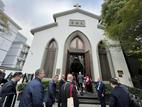It is a seemingly ordinary church in northern China. In it, an almost unnoticeable reform unfolds. In December 2024, at its annual conference, a major reform plan was passed: to implement a model of "tri-role divisions" in its administration. Three independent teams, namely the Administration, the Pastoral Ministry, and the Overseers Ministry, collaborate. In addition, the church has no single ultimate leader, relying instead on collective decision-making and the veto to ensure a balance of power.
Pastor Chen, one of the founders, had long been considered the head figure in everyone's mind. For years, like most other churches, it operated in a sole-leader administration style. Preachings, pastoral care, and administration, or almost everything needed to pass through him. As he puts it: "I am the founder, so I can 'steer the rudder'."
However, in its growth, the ministry diversified, and the services became increasingly specialized and complex. Therefore, he had long realized that "the older generation can't hold power or position forever; passing the baton to the younger generation is a mandatory choice."
Consequently, a few years ago, the church gradually transferred managerial responsibilities to younger believers. At that time, Pastor Chen initially expected the young people to bring new vitality and vision, but new problems emerged in practice.
"A pony to pull a gigantic cart, absolutely exhausting," Pastor Chen shares, describing the situation after the handover. "And it's not just the leaders being exhausted; everyone was. Moreover, even if the leader toiled to death, others remained unsatisfied." While the young leaders were no less (and perhaps more) passionate and visionary than their predecessors, they lacked authority and experience. Although they were assigned new leaders, many believers habitually sought out Pastor Chen to voice concerns, which inadvertently weakened their credibility, and internal tensions were building up fast.
"If the system doesn't change, anyone who leads might fall into the same predicament," Pastor Chen said.
Pastor Chen's son works abroad. A few years ago, he visited his son and had the opportunity to visit local churches and talk with several pastors. He discovers that many churches, despite their large size and long establishments, are stuck in administrative deadlocks. "Some founding leaders are absolutely capable, which you'd think is a good thing, but I find that the more capable the founding leaders are, the worse and more precarious the churches' situation often will be after they retire."
After prolonged observations and reflections, an idea gradually formed and solidified in his mind: Why not group people according to their different gifts and allow them to perform their respective duties?
Upon returning to China, he further refined his ideas, put them in writing, and sent the final draft to the church's core co-workers. To his relief, most people explicitly expressed their support. In December 2024, the church formally adopted the reform plan at its annual conference, which Pastor Chen calls jokingly the "Division of Three Powers:" the Administration takes charge of the church's daily management, finances, logistics, and other administrative duties; the Pastoral Ministry focuses on preaching, small groups, care, training, and other pastoral and spiritual duties of the church; and the Overseers Ministry, composed of experienced long-term co-workers, is responsible for guiding the church's development direction, handling major disputes, correcting errors or misdeeds, and so on.
Each division is a team of five to six core co-workers with one assigned team leader. The team leader does not have sole decision-making power; they simply have a slightly greater say, holding two votes in internal team voting and retaining a single veto power. Furthermore, each leader can serve a maximum of two terms, with each term lasting three years.
"If a leader disagrees on an issue, they can veto it; but if they want to put something forward, they must get the consents of the majority of the co-workers," Pastor Chen explained.
More importantly, on top of the three ministry teams, the church has a "Grand Core Group," composed of members of all teams. The Grand Group meets monthly to discuss cross-team issues. The decision-making mechanism is purely collective voting, with the minority submitting to the majority.
From December 2024 to June 2025, the new method has been adopted for over half a year. Pastor Chen said, "The effect is actually better than I had originally imagined."
The most obvious change is that the co-workers have finally "found their positions". Everyone performs their own duties, knowing clearly what they should or should not do. Those skilled in administration no longer need to worry about when it is their turn to preach. Those skilled in preaching are set free from 'awkward' duties that they are not trained in, like finance, venue management, HR matters, and many other miscellaneous tasks.
Once, the Administration Team proposed a budget for an event. The Overseers Ministry deemed the plan generally feasible but suggested some items could be streamlined, recommending a reassessment. Effected by cross-team communications in good faith, an optimized plan was reached, which saved expenses without compromising the event's goal. "Now we have multiple perspectives, and the money saved can be used by the church for other areas."
The core of the new approach lies in the fundamental change in decision-making. The term limit is also an important design to prevent the entrenchment of power. Regular rotation not only avoids problems that can arise from one person holding power for too long but also offers more co-workers opportunities for growth and services.
Some have raised concerns: Will this democratic church model cause the church to lose its agility? Will it be unable to advance reforms and innovations due to the conservatism of the majority? Pastor Chen does not deny this possibility. However, he emphasized, "The division of powers is never the core; it is only a tool that serves the maximization of the church's interests." He believes that the governance model can be adjusted at any time if genuine necessity demands. However, the key is around the "maximization of the church's interests."
He added that no system is perfect; the importance is to have a healthy mechanism for any corrections. "We now handle problems through the model, which itself can be adjusted, forming a dynamic balance."
In this bold transformation, Pastor Chen himself has completed a transition of role, retaining only as an "advisor". He said, "I've kept an advisor role for myself. When there are issues, the teams can ask me, and I'll help whichever team is weaker."
Pastor Chen insisted on promoting the transformation of the church governance model because, over the years, he has seen a fact: if one person's authority is too high, it is inevitable that they will make mistakes, which can ultimately lead the church in the wrong direction.
"We are still exploring and learning, but this path we are taking is solid," Pastor Chen said. "No matter what model is adopted, the core idea is the maximization of the church's interests."
(To protect the interviewee's privacy and at the interviewee's request, the church's name and specific location have been omitted.)
Originally published by the Christian Times
- Edited by Karen Luo, translated by Charlie Li












